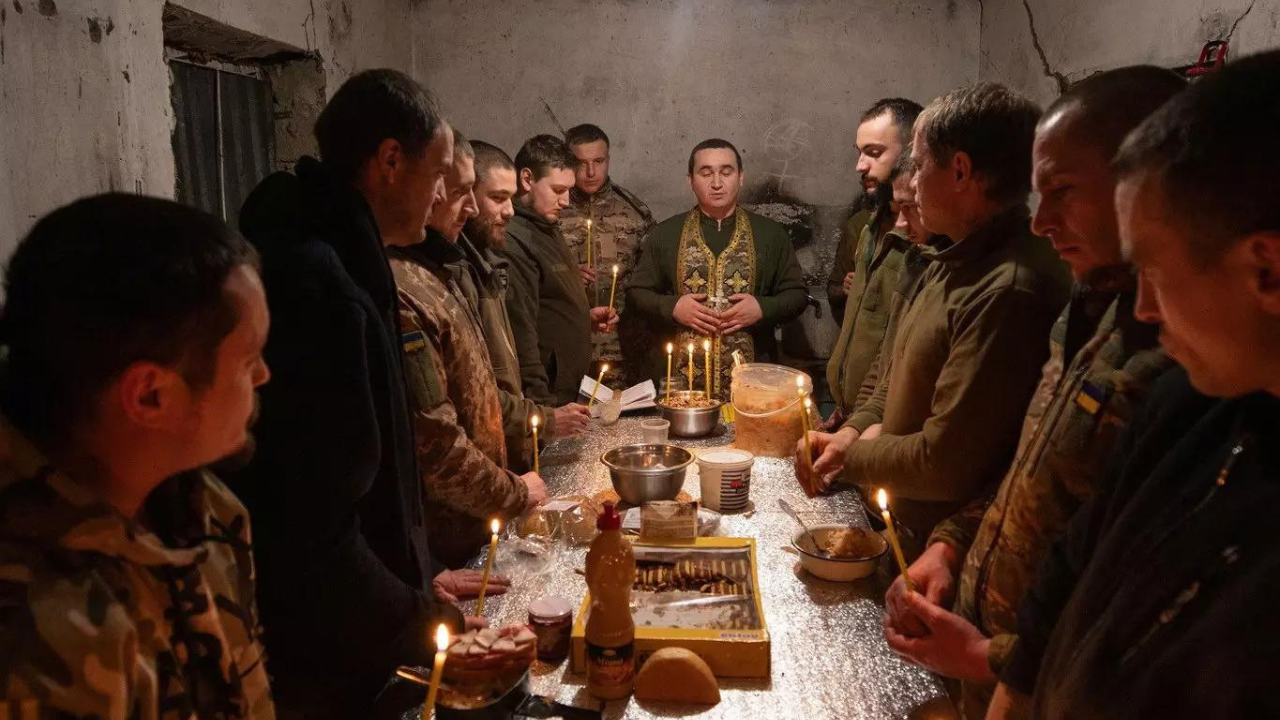[ad_1]
KYIV: Christmas lights flickered on ahead of schedule. Families sang carols a little sooner. And the first presents of the season – by tradition hidden under a pillow or in a boot – appeared two weeks early. Of Ukraine‘s many Western-oriented changes, put in place bit by bit since independence and accelerated during the war, one brought special joy this year: Christmas came early.
After centuries of marking the holiday on January 7 under the Julian church calendar, the Ukrainian Orthodox Church this year formally switched to celebrating on December 25 with most of the rest of Europe – and pointedly not with Russia.
For 6-year-old Drynka, that meant practicing carols early and enjoying the excitement of receiving gifts like a Rainbow High doll and a paint set two weeks earlier than she did last year. “I love Christmas!” she said. Her mother, Halyna Shvets, saw a step toward Europe in the Ukrainian church’s decision to shift the date away from Russia’s tradition, not only for Christmas celebrations but for other religious holidays as well.
Christmas, like so much else in Ukraine these days, is tightly tangled up in the country’s war with Russia. The Ukrainian Orthodox Church has taken the position that the Julian calendar used in the Russian church does not have religious significance, and that holidays should be celebrated according to the calendar by which people live their daily lives. Even before this year’s formal switch, some Ukrainian Orthodox believers, in the first year after Russia’s invasion, had moved Christmas to December.
Technically, the change in the celebration is a recommendation; individual parishes are deciding when to mark the holiday. But of the roughly 7,500 parishes in the Ukrainian Orthodox Church, all but 120 shifted the date of Christmas this year. Most Eastern Orthodox churches had already taken this position. After the Ukrainian church’s switch, only four of 15 eastern Orthodox denominations – in Russia, Serbia, Finland and Jerusalem – still follow the Julian calendar.
In his Christmas address, President Zelenskyy noted the second Christmas at war, and the shift in the date so that Orthodox and Catholic Ukrainians will celebrate on the same day. “Today, all Ukrainians are together,” he said. “We all meet Christmas together. On the same date, as one big family, as one nation, as one united country.” Zelenskyy said many Ukrainians would celebrate with empty places at the table for soldiers at the front. All, though, would pray for peace together “without a time difference of 2 weeks.”
After centuries of marking the holiday on January 7 under the Julian church calendar, the Ukrainian Orthodox Church this year formally switched to celebrating on December 25 with most of the rest of Europe – and pointedly not with Russia.
For 6-year-old Drynka, that meant practicing carols early and enjoying the excitement of receiving gifts like a Rainbow High doll and a paint set two weeks earlier than she did last year. “I love Christmas!” she said. Her mother, Halyna Shvets, saw a step toward Europe in the Ukrainian church’s decision to shift the date away from Russia’s tradition, not only for Christmas celebrations but for other religious holidays as well.
Christmas, like so much else in Ukraine these days, is tightly tangled up in the country’s war with Russia. The Ukrainian Orthodox Church has taken the position that the Julian calendar used in the Russian church does not have religious significance, and that holidays should be celebrated according to the calendar by which people live their daily lives. Even before this year’s formal switch, some Ukrainian Orthodox believers, in the first year after Russia’s invasion, had moved Christmas to December.
Technically, the change in the celebration is a recommendation; individual parishes are deciding when to mark the holiday. But of the roughly 7,500 parishes in the Ukrainian Orthodox Church, all but 120 shifted the date of Christmas this year. Most Eastern Orthodox churches had already taken this position. After the Ukrainian church’s switch, only four of 15 eastern Orthodox denominations – in Russia, Serbia, Finland and Jerusalem – still follow the Julian calendar.
In his Christmas address, President Zelenskyy noted the second Christmas at war, and the shift in the date so that Orthodox and Catholic Ukrainians will celebrate on the same day. “Today, all Ukrainians are together,” he said. “We all meet Christmas together. On the same date, as one big family, as one nation, as one united country.” Zelenskyy said many Ukrainians would celebrate with empty places at the table for soldiers at the front. All, though, would pray for peace together “without a time difference of 2 weeks.”
[ad_2]
Source link


